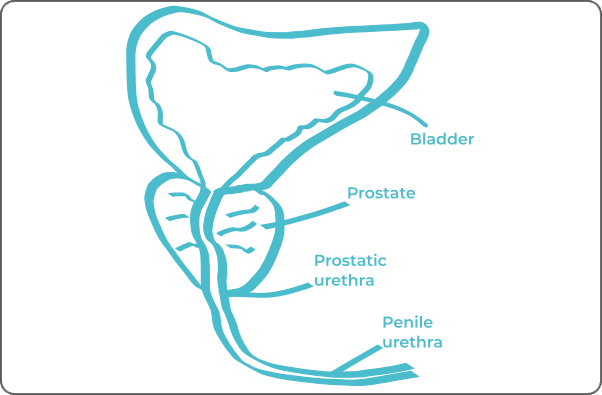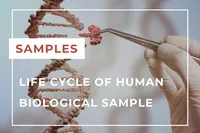Home › Biological sample › Cancer › Prostate
Prostate cancer biological samples
For research applications
The development of drugs and diagnostic tests for the treatment and detection of prostate cancer requires conducting studies on biological samples obtained from patients with prostate cancer.
A brief overview of the various types of prostate cancer and how the services offered by Labtoo contribute to accelerating research and development projects in the pharmaceutical industry.

Biospecimen from prostate cancer patients
Tissues from prostate cancer patients (tumoral & normal adjacent)
Fresh resection & biopsy
Frozen samples (OCT & FF)
FFPE blocks & slides
Blood derivatives from prostate cancer patients
-
Whole Blood
-
PBMC
-
Plasma
-
Serum
Biofluids from prostate cancer patients
-
Urine
-
Other
Associated clinical data from prostate cancer patients
-
Age
-
Gender
-
TNM Classification
-
Undergone Treatment
-
Medical Imaging
-
HIV/HBV/HCV status
-
Mutations
-
Other Data (upon request)
Send your request to our team:
What are prostate tumors?
The prostate is a small gland located beneath the bladder, playing a crucial role in the production of seminal fluid, a major component of semen. Prostate glandular cells secrete substances that contribute to the nutrition, protection, and mobility of spermatozoa.
Prostate cancer ranks as the most prevalent cancer in men. In 90% of cases, it is an adenocarcinoma, developing from the glandular epithelial cells that make up the lining of the prostate. Other types of tumors associated with the prostate include less common carcinomas and sarcomas.
The characterization of prostate cancer often relies on its stage of advancement, distinguishing between intracapsular and extracapsular stages:
Intracapsular stage
Present in 80% of cases.
This stage involves cancer localization either in the peripheral zone near the rectum (approximately 80% of localized cancers), in the transition zone adjacent to the urethra (15% of localized cancers), or more rarely (5%) at the base of the prostate.
Extracapsular stage
This stage is characterized by the breach of the prostate capsule.
Cancer cells will migrate through blood and lymphatic vessels to reach distant organs such as the liver or lungs.
This situation is then referred to as metastasis.
| Type of Cancer | Cell of Origin | Frequency |
|---|---|---|
| Adenocarcinoma | Glandular epithelial cells | ≈ 90% |
| Urothelial Carcinoma | Urothelial cells | Rare |
| Squamous Cell Carcinoma | Squamous epithelial cells | Rare |
| Sarcoma | Connective tissue (stroma) | Rare |

Explore Labtoo's Service for Your Biological Sample Research
Labtoo assists you in sourcing biological samples from prostate cancer patients. Our team manages the entire project of transferring biological materials from inception to sample delivery.
- Feasibility assessment of sample availability or clinical collection from referenced clinical centers
- Validation of regulatory aspects
- Establishment of a contractual framework
- Dispatch of desired samples under appropriate conditions
- Transfer of associated clinical data
- Additional analytical and experimental services
The stages and grades of prostate cancer
The stage and grade of cancer are commonly used together to provide a comprehensive assessment of the disease and guide optimal treatment.
The determination of cancer stage primarily relies on the TNM classification, which evaluates the tumor size (T), involvement of lymph nodes by cancer cells (N), and the presence of metastases in other parts of the body (M). Concurrently, the grade provides an indication of the degree of differentiation of cancer cells.
Regarding grades, denoted from 1 to 3, Grade G1 indicates well-differentiated cells resembling normal cells, Grade G2 represents moderately differentiated cells, and Grade G3 indicates poorly differentiated cells, suggesting faster and potentially more aggressive growth.
For prostate, the stages are defined as follows:
Stage I
The disease is not detected on digital rectal examination, with very few cancer cells present.
No symptoms.
Stage II
Detection of a hard mass upon digital rectal examination.
The cancer remains localized, affecting only one lobe of the gland.
Stage III
The cancer advances, with an expansion of cells beyond the gland.
There is a possibility that they have reached the seminal vesicles.
Onset of symptoms such as urinary disturbances.
Stage IV
The cancer has spread to adjacent organs (rectum, bladder, sometimes bones, and lungs).

Rare forms of prostate cancer
Occasionally, rare forms of pancreas cancer develop, among which are:
-
Urothelial Carcinoma
Also known as transitional cell carcinoma, this type of cancer is more commonly associated with bladder cancer cases. However, it can also occur within the urothelial cells covering the prostatic urethra.
-
Epidermoid Carcinoma
Epidermoid cells, typically found in the skin epidermis and mucous membranes, may undergo abnormal development in the prostate, giving rise to epidermoid carcinoma.
-
Sarcoma
Prostate sarcomas arise from mesenchymal cells, which constitute the connective tissue. These cells are present in relatively low proportions in the prostate, contributing to the extreme rarity of this pathology
Prostate cancer treatments and advances
The treatment of prostate cancer is determined by several factors, including the type of cancer, its stage, and the patient's physical condition. The main therapeutic modalities include:
-
Surgery: Prostatectomy, or surgical removal of the prostate, is commonly employed, often assisted by laparoscopy. It is frequently recommended in cases of localized cancer.
-
Radiotherapy: This modality utilizes X-ray radiation to destroy cancer cells or inhibit their growth. Often used in conjunction with surgery, radiotherapy can also be administered as a monotherapy for prostate cancers.
-
Chemotherapy: Unlike in other cancers, chemotherapy is sparingly used in prostate cancer treatment protocols. It is primarily reserved for metastatic cancers.
-
Hormone Therapy: Hormone therapy, one of the most effective treatments, aims to reduce the production of testosterone, a hormone used by prostate tumor cells for proliferation. It is often combined with radiotherapy.
Newer approaches such as immunotherapy and targeted therapies (e.g., kinase inhibitors) are currently in the clinical research stage for the treatment of prostate cancer.




